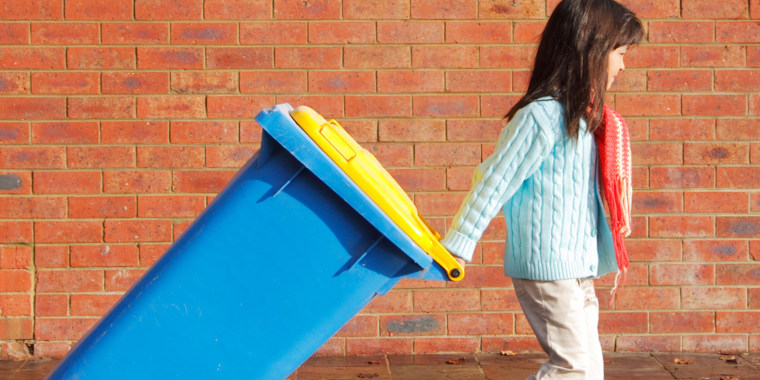Young children may often blame others for their own actions. At this age, they are often aware of rules and if they break them they may try to shift the blame to others or say it was out of their hands. However, learning to take responsibility from an early age can teach your child that she has control over her life. She may feel more invested in the choices she makes and the actions she takes because she begins to realize that she can affect the outcome of events.
Try using “we” frequently in conversation. Teaching responsibility at a young age can start by using the word “we” when speaking with your child. For example, “We put dishes in the sink after dinner,” or, “We pick up our toys before bed,” and even, “We treat others the way we would like to be treated.” This creates a home culture (how you do things in your home), which can help give your child confidence about her place in the family. Belonging to a family unit (whatever that looks like) can become a point of pride for a child. Taking responsibility at this age can center around small household tasks like helping pick up toys, washing fruits and vegetables for dinner, or even helping sort whites and darks for laundry.
Responsibility is also about others, and your child should be learning how his actions make others feel and how he affects others. Even from an early age, children can hurt each other’s feelings by name-calling or forming cliques. It’s important to teach your child that everyone has the right to their own feelings and opinions and that they are valid even if they are different from his own. Teach him that no matter what his feelings or opinions are, he does not have a right to treat others unfairly. Also teach him to apologize when he hurts another person, which allows you to show him the value of taking ownership of his actions.
Give your child the opportunity to make reparations when she hurts someone. Maybe she forgot to invite a friend to her birthday party, or she didn’t sit by a friend at lunch like she normally does.
Suggest to your child that perhaps that is the reason why her friend is upset with her and that one way to remedy that would be to apologize. Learning to say “I’m sorry”—and to mean it—is another valuable skill for your young child to learn. To help your child further her understanding of apologies, have her work on saying something after “I’m sorry” and taking steps to prevent the wrongdoing in the future. For example, if your child breaks a sibling’s toy, you could ask her to think of a way she could make her sibling feel better. An apology could be “I’m sorry I broke your toy. I know it hurts your feelings that it’s broken. Next time I’m playing with your toys I will try to be more careful.”
Children often first tell lies when they break something by accident or take something that doesn’t belong to them. How you react to your child’s wrongdoing is critical, as she may be more or less likely to continue to tell you about the wrongdoing based on your reactions. Try to remain calm and even take a few minutes to address your child if you need to. One way you can support your child’s responsibility is to tell her ahead of time that you won’t love her any less for her mistakes or accidents. Tell her you’ll admire and respect her even more if she’s honest with you from the start. For example, try saying, “I am very sorry to hear you did that, but I am pleased that you told me honestly. That was not easy to do.”
Parent Toolkit resources were developed by NBC News Learn with the help of subject-matter experts, including Maurice Elias, Director, Rutgers Social-Emotional and Character Development Lab; Jennifer Miller, Author, Confident Parents, Confident Kids; and Michele Borba, Author and Educational Psychologist.
